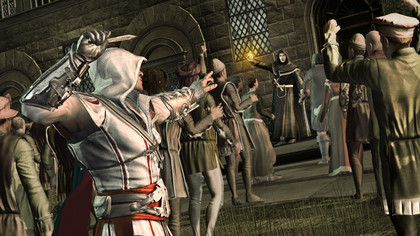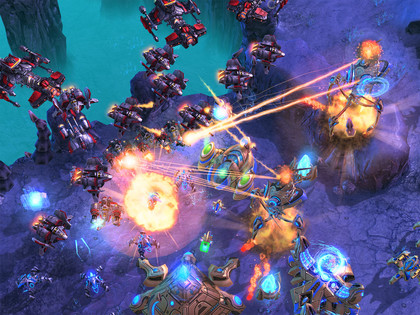1. It prevents sharing and reselling games
Obviously, publishers would rather you didn't pass a game onto a mate when you're done with it, or worse still have the both of you be able to play it from just one disc. However, it's permitted on console - as is the resale market.
A few places will accept PC game trade-ins, but not ones that have been activated. Increasingly, we're also seeing PC games - most recently Mass Effect 2 - that bind major content, masquerading as DLC, to a single online account, rendering themselves close to worthless for trade-in.
Legitimate PC game purchasers are being punished unduly because of a perception that sharing is piracy. Even the good guys get this wrong - Valve's digital distribution Steam may be packed with useful internetty bonuses, but if you want to play a game you've bought on it over LAN with a mate in the same house, you're screwed. Gaming's best experiences are often shared experiences - it's insane to deny that to players.
2. Internet connections are not constant
This is why Ubisoft's latest approach to DRM is not simply draconian, but also contemptuous to its paying customers. Yes, in ten years we'll probably have constant instant connections wherever we go.
Right now, though, we have train tunnels, we have flaky ISPs and routers, we have Wi-Fi-ruining microwaves, we have soldiers and oil rig workers trying to play games whilst miles away from steady broadband, we have people taking their laptops on trips or waiting for broadband to be installed in their new homes…
Sign up for breaking news, reviews, opinion, top tech deals, and more.
There are endless situations in which people who've paid for Assassin's Creed 2, Silent Hunter V, The Settlers 7, RUSE et al won't be able to play the game they've laid out hard cash for. DRM will increasingly be about online authentication: this is inevitable. But the world's internet infrastructure simply isn't yet ready for what a constant-connection system demands.

CHANGING TIMES: Two weeks before its official release, Assassin's Creed 2 has had a patch which means you're no longer thrown back to the last checkpoint if you lose your web connection. Is this the first sign of a Ubi climb-down?
3. A torrented copy is not a lost sale
We'll often hear stats like 'x hundred thousand people torrented Modern Warfare 2', and we'll duly gasp and think 'goodness, piracy is killing PC gaming.'
Unfortunately, such figures are hugely misleading, as they're based on a presumption that every torrented copy of the game is one less copy bought from a store. Of course that's not true: most of the people pirating a game wouldn't have ever countenanced buying it in any situation. They're just not interested in the game enough to spend the money.
On the plus side, though, more people playing the game, regardless of circumstances, is more people talking about the game – which may in turn shift more legitimate copies.

BETTER ONLINE: For another game that makes online functionality into its backbone rather than a noose, look to the current Starcraft 2 beta. The new Battle.net multiplayer system turns the game lobby into an info-packed browser/downloader
4. DRM punishes customers, not pirates
This is the rub of it. Pirates will always out, no matter now hard publishers try to copy-protect their games. Indeed, on the day of writing this piece, word was circulating that Ubisoft's controversial new DRM system had been cracked out of Silent Hunter V - just one day after its release.
People who pirate games will find a way to circumvent the restrictions. People who legitimately pay for the games will have to suffer the restrictions. Or turn to piracy to avoid them.
-------------------------------------------------------------------------------------------------------
Liked this? Then check out Is free really the future of gaming?
Sign up for TechRadar's free Weird Week in Tech newsletter
Get the oddest tech stories of the week, plus the most popular news and reviews delivered straight to your inbox. Sign up at http://www.techradar.com/register